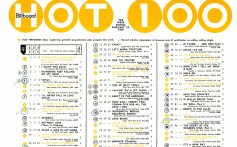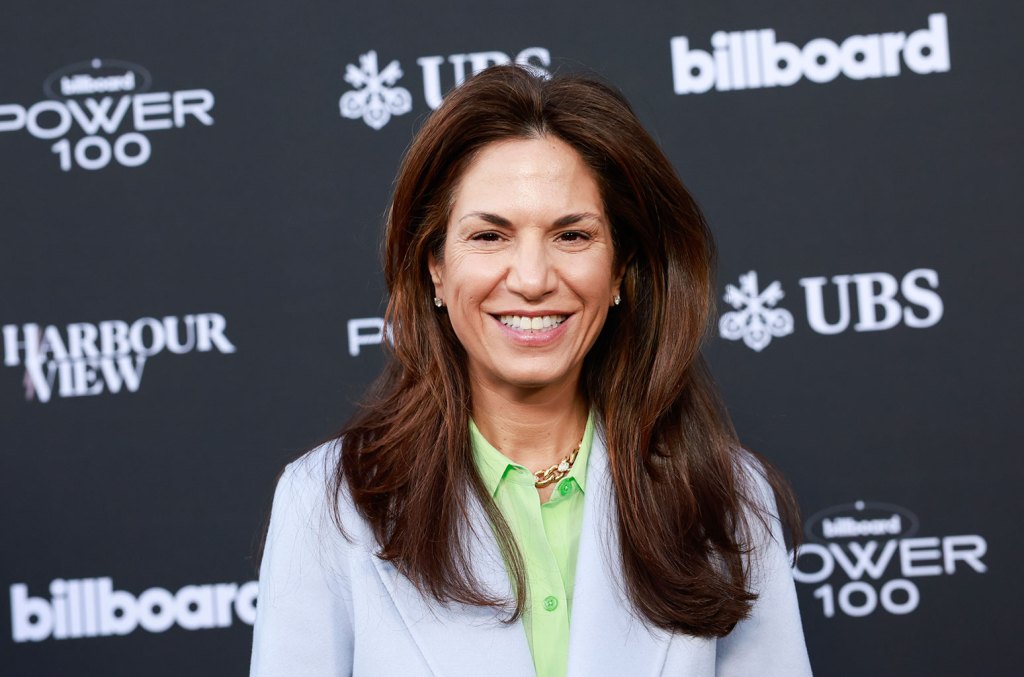earnings
Page: 2
Trending on Billboard
Sphere Entertainment Co. reported on Tuesday (Nov. 4) that the success of The Wizard of Oz and the Backstreet Boys residency at its state-of-the-art Las Vegas venue boosted revenue and operating income — though those gains couldn’t offset a nearly $130 million operating loss in the third quarter.
Sphere Entertainment generated revenue of $262.5 million, up 15% or $34.6 million, for the quarter ending Sept. 30, compared to the same period last year. Adjusted operating income, an indicator of how much of a company’s revenue will eventually become profit, rose to $36.4 million from negative $10.2 million a year ago. The company also reported an operating loss of $129.7 million, up $12.1 million from a year ago.
Related
Since opening in 2023, Sphere has become a destination for artist residencies, hosting acts including U2, Phish, the Eagles, electronic act Anyma and now the Backstreet Boys, who recently extended their Into the Millennium residency into February 2026. Upcoming acts include the DJ/producer Illenium, who’s slated for a residency in March and April, and No Doubt, which will play the venue beginning in May.
When Sphere isn’t occupied by a concert, the mega-venue also shows movies, including the U2 immersive concert film recording of its U2:UV Achtung Baby Live residency and The Wizard of Oz at Sphere. The company’s executive chairman and CEO, James Dolan, has said that recording, licensing and adapting these films costs significantly less than live performances and presents meaningful upside revenue.
The Wizard of Oz at Sphere — an immersive adaptation of the classic 1939 movie — has sold more than 1 million tickets and generated more than $130 million in sales since its Aug. 28 premiere, the company reported late last month.
Related
In a statement, Dolan called The Wizard of Oz “the best example to-date of experiential storytelling in this new medium.”
He added that the film “has been met with strong consumer demand. Looking ahead, we believe our Company is well positioned for long-term growth as we continue to execute on our global vision for Sphere.”
Quarterly revenue generated by the company’s Sphere segment rose 37% overall to $174.1 million in revenue over the same period last year, boosted by $28.3 million more in revenue coming from the venue’s film screenings, collectively known as The Sphere Experience.
The Sphere Experience posted higher per-show revenue from its 220 showings (up from 207 last year) of three movies: Postcard from Earth, the immersive U2 concert film and The Wizard of Oz at Sphere. An additional 16 concert residency shows compared to the prior year quarter also helped boost event-related revenue by $15 million, though that was offset by “lower average per-concert revenue due to the mix of concerts” and the absence of big sporting and corporate events in the quarter. Sponsorship and advertising on the outside of Sphere, along with suite licensing fees, rose $2.7 million from a year ago.
Related
But more movies and shows mean more expenses, and those associated with The Sphere Experience rose by about $10 million. Meanwhile, event expenses primarily from residency shows rose by nearly $4 million, contributing to an overall 26% increase in the Sphere segment’s operating expenses, which totaled $78.7 million for the third quarter.
Overall, the Sphere segment posted an operating loss of $84.4 million — a $40.6 million improvement from last year — and adjusted operating income of $17.1 million.
Elsewhere, MSG Networks revenue fell 12% to $88.4 million on a more than 13% decline in subscribers and a $12.7 million decrease in distribution revenue.
Trending on Billboard
Live Nation’s revenue grew 11% year over year to a third-quarter record of $8.5 billion, the company announced Tuesday (Nov. 4).
The world’s largest concert promoter and ticketing company continued to benefit from vigorous consumer demand for live music since the touring business came back from the COVID-19 pandemic. Adjusted operating income (AOI) of $1.03 billion was a 14% increase from the prior-year period. Importantly, event-related deferred revenue and Ticketmaster deferred revenue were up 37% and 30%, respectively, suggesting Live Nation is well situated for upcoming quarters.
Related
“Strong fan demand drove another record quarter, as we continue to attract more fans to more shows globally,” CEO Michael Rapino said in a statement. “With these tailwinds, 2026 is off to a strong start with a double-digit increase in our large venue show pipeline and increased sell-through levels for these shows.”
Foreign exchange had a small impact on reported results. In constant currency, revenue was up 9% (compared to 11% as reported) and AOI was up 12% (compared to 14% as reported).
Within the concerts division, record-high stadium show attendance drove revenue up 11% to $7.3 billion and AOI up 8% to $514 million. Live Nation hosted 51 million fans, and attendance was up by double-digits in all major markets. International markets were led by Europe and Mexico, where attendance growth reached double-digits.
Related
Fan demand has undergone explosive growth since the COVID-19 pandemic. Live Nation’s third-quarter revenue of $8.5 billion was 38% greater than the $6.15 billion it generated in the same quarter of 2022. That improvement is dwarfed by the 125% revenue growth the company has experienced since the third quarter of 2019, a time before Live Nation acquired a majority stake in Mexican promoter OCESA in 2021.
Within the Venue Nation segment, Live Nation’s division that owns and operates venues worldwide, fan spending through October rose 8% at amphitheaters and 6% at major global festivals. Investments in renovations have helped some venues improve fan spending. For example, onsite fan spending at Jones Beach in New York was up 35% through October, while onsite spending at Estadio GNP in Mexico City tripled in the first ten months of the year.
At Ticketmaster, Live Nation’s ticketing division, revenue climbed 15% to $798 million while its AOI jumped 21% to $286 million. The improvement came from a combination of more ticket sales and higher average ticket prices: In the quarter, fee-bearing tickets rose 4% to 89 million, while fee-bearing gross transaction value (GTV) rose 12%.
Related
Through the first nine months of 2025, Ticketmaster’s total fee-bearing GTV rose 7% due to a 16% increase in international markets. Primary fee-bearing GTV improved 8% while secondary GTV declined 1% on lower sports activity.
Live Nation’s sponsorships division had record revenue of $443 million, up 13% from the prior-year quarter. With a gross margin percentage of 71%, the highest of the company’s three divisions, sponsorship’s AOI of $313 million, up 14% year over year, bested Ticketmaster on 44% less revenue.
The number of the sponsorships division’s strategic partners rose 14%. New agreements include consumer brands Hollister, Kraft Heinz and Patrón. The division added a multi-year deal with Trips.com in Asia and expanded its partnership with Mastercard to additional markets, including Hong Kong, South Africa and the Middle East.
Related
Live Nation is on pace for a record-setting 2025. Through the first nine months of the year, revenue is up 8% to $18.89 billion and AOI is up 9% to $2.17 billion. The record-setting third quarter is expected to flow into a strong fourth quarter. Arena, theater and club shows will bring the company to full-year attendance of approximately 160 million, which would be a 6% increase from the 151 million fans it saw in 2024. Live Nation expects to deliver double-digit AOI growth for the full year.
Looking ahead to 2026, the company expects continued growth. In addition to growth in deferred revenue — money received for future events — Live Nation expects a double-digit increase in large venue shows in 2026. Average grosses for 2026 concerts are up double-digits on strong sell-through levels.
Trending on Billboard Spotify said on Tuesday its third quarter revenue and profit margin improved thanks to double-digit growth in subscribers and monthly active users. The leading music and podcast streaming platform said its pool of paying subscribers rose by 12% to 218 million, and its monthly average users rose 11% to 713 million from […]
Trending on Billboard
HYBE shares soared 18.4% in the week ended Oct. 31 after a South Korean court ruled that K-pop group NewJeans may not leave HYBE imprint ADOR and make music under a different name. The five members of the girl group had attempted to break away from HYBE after the K-pop giant dismissed NewJeans’ mentor, ADOR CEO Min Hee-jin, in April 2024.
Rather than lose NewJeans — which would have created additional headaches for HYBE and other K-pop companies — ADOR will retain the group through the end of its exclusive contract in 2029. The fact that Min is no longer at ADOR didn’t sway the court. “Merely the fact that NewJeans personally places high trust in Min Hee-jin does not make guaranteeing her the position of ADOR’s CEO a significant obligation under the exclusive contract,” according to a report. The ruling added approximately $1.5 billion to HYBE’s market value, suggesting that investors were fearful a court loss would spill over to other acts currently under contract with HYBE.
Related
Despite HYBE’s considerable gain, the 19-company Billboard Global Music Index was unchanged at 2,845.53. Music stocks were almost evenly mixed between winners and losers, and only two companies had either a gain or a loss in excess of 10%.
Music stocks lagged behind major indexes’ gains. In the U.S., the Nasdaq composite index rose 2.2% to 23,724.96 and the S&P 500 improved 0.7% to 6,840.20. The U.K.’s FTSE 100 rose 0.7% to 9,717.25. South Korea’s KOSPI composite index jumped 4.2% to 4,107.50 on AI optimism after Samsung announced it would build a semiconductor factory in partnership with American company Nvidia. China’s Shanghai Composite Index ticked upward 0.1% to 3,954.79.
SiriusXM shares finished the week up 1.4% to $21.69 after a see-saw end to the week. The stock gained 10.1% on Thursday (Oct. 30) after the company’s third-quarter results, but fell 6.5% on Friday (Oct. 31). The bump in share price came after SiriusXM increased its full-year forecasts for revenue, EBITDA and free cash flow. The Q3 results also showed that the satellite radio company, which also owns streaming platform Pandora, turned a net loss into a net profit.
Related
Universal Music Group shares fell 2.3% to 23.27 euros ($26.99) despite gaining 1% on Friday after the company reported solid Q3 earnings following the close of trading on Thursday. Following the results, J.P. Morgan reiterated its “overweight” rating and 39.00 euros ($45.23) price target while Guggenheim maintained its “neutral” rating and eliminated its price target, which was previously 27.00 euros ($31.32).
Spotify’s stock benefited from news that the company is raising prices in the U.K., finishing the week up 1.5% to $655.32. That modest gain helped Spotify reclaim some of the loss it suffered after the share price dropped 4.1% on Oct. 24. The Stockholm-based company will report Q3 earnings on Tuesday (Nov. 4).
Radio giant iHeartMedia was the week’s biggest loser after dropping 12.4% to $2.97. The company’s share price has been on a roll lately, though, gaining 39.4% in 2025. iHeartMedia will release Q3 earnings on Nov. 10.
Most live music stocks lost ground. Live Nation fell 2.2% to $149.53 ahead of its earnings results on Tuesday. German promoter CTS Eventim dropped 2.9% to 77.60 euros ($90.00). MSG Entertainment dipped 3.5% to $44.16. Sphere Entertainment Co. was an exception, rising 1.7% to $68.48.
Billboard
Billboard
Billboard
Trending on Billboard
Universal Music Group (UMG) reported solid growth across all three business units on Thursday (Oct. 30), with revenue rising 10.2% in constant currency to 3.02 billion euros ($3.53 billion). Early shipments of Taylor Swift’s The Life of a Showgirl, which had an Oct. 3 street date, helped UMG’s physical sales jump 23% year over year. But the quarter was dominated by subscription gains and strong publishing results. During Thursday’s conference call, the conversation was heavy on AI and UMG’s new partnership with the generative AI platform Udio.
Here are some main takeaways from UMG’s third-quarter results and executives’ comments during Thursday’s conference call.
Related
UMG Announced a Renewed Licensing Deal with YouTube
Usually, a major announcement regarding a leading streaming platform gets its own press release. But during Thursday’s conference call, CEO Lucian Grainge slipped news of UMG’s new licensing deal with YouTube into his opening remarks. It’s the company’s third licensing deal in its “Streaming 2.0” initiative and covers both recorded music and publishing. Previous Streaming 2.0 deals, which the company says prioritize artist-centric principles, were signed with Amazon in December and Spotify in January.
“The agreement includes all aspects of YouTube’s various music services and platforms, embodies our artist centric principles and drives greater monetization for artists and songwriters,” Grainge said. “And as part of our new YouTube deal, we’ve secured really important guardrails and protection for our artists and writers around Gen AI content.”
The Udio Partnership Furthers UMG’s Superfan Ambitions
Some people view a generative AI platform as a means to create music that competes with artists signed to both major and independent record labels. That may have been the common perception of Udio, a popular music-making platform that requires only simple text prompts to create fully formed songs. But on Thursday, UMG made it clear it views its newly signed licensing partnership with Udio as part of its ambitions to reach “superfans,” the people who spend the most time and money on music. That puts Udio in the same category as the long-awaited superfan tiers of subscription services such as Spotify.
Related
“What we’ve announced with Udio, and in terms of artist centricity, what’s significant there is that the product vision is to focus on a superfan experience for customization, a deep engagement [and] hyper-personalization of the experience for fans interacting through AI technology with the artists that they love,” chief digital officer Michael Nash explained during the conference call. Nash called Udio’s new platform, which will launch in 2026, a “subscription service [that] will transform the user engagement experience, creating a license to protect the environment, to customize, stream and share music responsibly on the audio platform.”
The Artist is Central to AI Music
UMG executives were coy when asked for specifics about the Udio partnership, but they repeatedly emphasized that any AI music platform that partners with UMG will have an artist-centric approach. Nash mentioned UMG’s just-announced partnership with Stability AI, a startup that builds generative AI models for audio and video, to create new tools that benefit its artists and songwriters.
“The economics of the music ecosystem are really driven by fans’ desire to engage with artists and by fans’ desire to participate in music culture,” Nash explained. “We’re envisioning products that deepen both of those things.” Nash pointed to UMG’s internal research of the U.S. market that revealed 50% of music consumers are interested in AI “in relationship to their music experience.” But fake artists ranked lowest amongst U.S. consumers. “There’s a lack of traction” amongst fake artists, he noted, “other than the occasional novelty phenomenon that may capture some headlines.”
Related
Short-Form Video Has Caused a “Disruption” in Ad-Supported Royalties
People love watching short videos on platforms such as TikTok and YouTube Shorts. Unfortunately for record labels and music publishers, newer short-form platforms don’t monetize music as well as older, long-form platforms with established advertising businesses. As a result, UMG’s streaming revenue — everything other than subscriptions — was flat in constant currency. Other than digital downloads, which were also flat, every other aspect of UMG’s recorded music division posted gains in the quarter. Nash said UMG’s recent licensing deals, including the one with YouTube that was announced during the conference call, were the result of “broad-based efforts” to address the “disruption” to ad-supported royalties caused by short-form video and efforts to better monetize it.
UMG is Making Progress with Japanese Music — Both Inside and Outside of the Country
Japanese music has a reputation for not traveling well, but Grainge highlighted the success of Japanese artists outside of their home country. In March, BABYMETAL signed to Capitol Music Group in the U.S. and, according to Grainge, became the first Japanese artist ever to reach the top 10 of the Billboard 200 album chart with its album Metal Forth. Earlier this year, Grainge added, UMG’s J-pop artist Ado played to 500,000 fans in 33 cities across Asia, Europe, the U.S. and Latin America. UMG fared well inside Japan, too, led by releases from Mrs. GREEN APPLE and Fujii Kaze, with strong sales there helping drive UMG’s 23% increase in physical sales.
Additionally, Grainge said that UMG recently increased its majority stake in Japanese label and artist management company A-Sketch by acquiring the minority stake of KDDI Corporation. UMG initially acquired its majority interest in February by purchasing the stake of the company’s co-founder, Amuse.
Related
The Best Subscription Growth in Q3 Came from Outside the U.S.
Growth in subscribers in the top 10 markets, not price increases, was the major factor in UMG’s 8.7% (in constant currency) subscription revenue growth, said CFO Matt Ellis. But the U.S. wasn’t at the top of the list. UMG saw double-digit subscription growth in China, Brazil and Mexico, while in the U.S., it saw high single-digit growth. Four of UMG’s top five streaming services delivered double-digit or high single-digit revenue growth.
With 8.7% subscription growth, UMG was within the 8% to 10% range it targets for long-term growth. Good thing, too, since investors see subscription growth as an all-important metric when assessing UMG’s market value. “We remain encouraged by the trajectory of the subscription business,” said Ellis.
Trending on Billboard SiriusXM Holdings saw quarterly revenue slip 1% year-over-year to $2.16 billion, though it reversed a loss from a year ago to generate $297 million in positive net income, the company reported Thursday (Oct. 30). That turnaround — Sirius reported a net loss of $2.96 billion in the third quarter of 2024, stemming […]
Trending on Billboard
On the strength of top sellers from the KPop Demon Hunters soundtrack, Sabrina Carpenter and Morgan Wallen, Universal Music Group’s revenue grew 5.3% to 3.02 billion euros ($3.53 billion at the quarter’s average euro-to-dollar exchange rate) in the third quarter of 2025, the company announced Thursday (Oct. 30). In constant currency, which removes the impact of considerable foreign exchange fluctuations since the beginning of the year, UMG’s revenue rose 10.2% in the quarter.
With all three of UMG’s business units posting gains, adjusted earnings before interest, taxes, depreciation and amortization (EBITDA), a common measure of profitability, increased 6.9% (11.6% in constant currency) to 594 million euros ($694 million). Adjusted EBITDA margin — EBITDA as a percentage of revenue — improved to 22.0% from 21.6%.
Related
CEO Lucian Grainge emphasized the company’s long-term value creation and strategic efforts that don’t show up in the financial results. “Importantly, we continued to drive progress on our strategic plans, including our artists’ and songwriters’ creative and commercial success, our global expansion, the industry’s embrace of our responsible AI initiatives and the continued implementation of Streaming 2.0.,” he said in a statement. A day earlier, UMG announced a settlement and licensing agreement with AI music generator Udio. Just hours before earnings were released, UMG trumpeted a partnership with Stability AI to create tools for artists and producers that are powered by “responsibly” trained generative AI.
In the recorded music division, revenue rose 3.6% (8.3% in constant currency) from the prior-year period to 2.22 billion euros ($2.60 billion). Recorded music subscription revenue improved 3.6% (8.7% in constant currency) to 1.52 billion euros ($1.78 billion), in line with the company’s projections of 8% to 10% annual growth. The company said subscription growth came primarily from an increase in the number of global subscribers.
Other streaming revenue, which included ad-supported streaming, fell 4.8% (flat in constant currency) to 337 million euros ($394 million). The company attributed the decline to a shift in streaming activity to poorly monetized short-form videos from more effectively monetized video platforms.
Related
Physical sales jumped 18.4% (23.1% in constant currency) to 341 million euros ($399 million) due to initial shipments of Taylor Swift’s The Life of a Showgirl, which had a street date after the end of the third quarter. Licensing and other revenue improved 0.9% (4.1% in constant currency) to 328 million euros ($383 million). Digital downloads were down 7.1% (unchanged in constant currency) to 39 million euros ($46 million).
Music publishing revenue improved 8.6% (13.6% in constant currency) to 543 million euros ($635 million). Publishing’s digital revenue grew 10.8% (16.8% in constant currency) to 327 million euros ($382 million) due to streaming growth and subscription revenue gains. Performance revenue rose 13.9% (17.3% in constant currency) to 115 million euros ($134 million). Synch revenue fell 1.6% (rose 3.3% in constant currency) to 63 million euros ($74 million). Mechanical royalties were down 7.1% (3.7% in constant currency) to 26 million euros ($30 million).
Merchandising and other revenue grew 9.3% (15.6% in constant currency) to 259 million euros ($303 million). Lower direct-to-consumer sales were more than offset by growth in touring merchandise sales.
Trending on Billboard
Gains from self-paying subscribers almost equally offset losses from partnerships as French music streaming company Deezer’s revenue fell 0.9% to 131.4 million euros ($154 million) in the third quarter, the company announced Thursday (Oct. 23).
“Subscriber growth in France has accelerated for a third consecutive quarter, confirming the positive impact of our differentiation initiatives in our home market,” CEO Alexis Lanternier said in a statement. “In the rest of the world, subscription numbers in the Direct segment are also picking up pace, reflecting the quality of our service and the appeal of our brand as we champion transparency and fairness in music streaming.
Related
Revenue from partnerships fell 12.6% to 35.6 million euros ($42 million) and subscribers from these partnerships dropped 24.5% from the prior-year quarter. Deezer powers music streaming platforms for numerous companies globally and counts these partnership subscribers separately from subscribers who pay directly. The company attributed the loss in its partnerships business to “the residual impact” of a business model shift by Mercado Libre, a Latin America e-commerce company that partnered with Deezer in 2023. A focus on higher average revenue per user (ARPU) also contributed to the decline in partnership subscribers, the company said.
Direct subscribers grew in number to 5.5 million, up nearly 10%, and direct subscription revenue increased 1.6% to 87.9 million euros ($103 million). France accounted for 3.7 million of those direct subscribers, an 11.7% increase from the prior-year period, which the company attributed to “good performance” of family plans. Direct subscribers from the rest of the world rose 6.1% to 1.8 million.
ARPU from direct subscribers fell nearly 5% to 5.4 euros ($6.31) per month. Partnership ARPU rose 6% to 3.1 euros ($3.62) per month.
Related
Other revenue, which consists of advertising and ancillary revenue, rose 17.4% to 7.9 million euros ($9.2 million). Deezer said the improvement “mainly reflected the performance of the white labelling solutions for hardware / media partners.”
While relatively small compared to the likes of Spotify and Apple Music, Deezer has attempted to separate itself from its competitors by making combating AI music a business priority. In September, the company revealed that it detected the delivery of over 30,000 fully AI-generated tracks each day. That accounts for 28% of all daily track uploads, up from 18% in April and 10% in January. These fully AI-generated tracks are eliminated from Deezer’s algorithmic recommendations and excluded from editorial playlists.
Looking ahead, Deezer confirmed its full-year guidance in which it expects positive adjusted earnings before interest, taxes, depreciation and amortization (EBITDA) and positive free cash flow for the second consecutive year.
Now that all the major music companies have reported earnings for the quarter ended March 31, it’s a good time to reflect on the notable performances in the bunch. Most companies posted good results and showed that music is a reliable business during times of uncertainty, with nearly all trending in the right direction (though companies not mentioned here didn’t necessarily have something to crow about). But because companies naturally experience ebbs and flows — a slow new release schedule or heavy sales of low-margin vinyl records can wreak havoc on market perceptions — the results for any one quarter won’t tell the entire story.
Below, I run down a few notable and/or interesting highlights from the latest earnings releases. For a full recap of earnings reports, refer to Billboard’s 2025 Q1 earnings roundup, which provides quick summaries of music companies’ earnings reports issued from April 29 to May 28. Best top-line revenue growth: 22% by CTS Eventim
Trending on Billboard
German concert promoter and ticketing company CTS Eventim’s top-line revenue got a boost from its 2024 acquisitions of See Tickets and France Billet, as consolidated revenue jumped 22.0% to 499 million euros ($525 million). Growth of the existing business was “slightly higher” than a strong prior-year period, CFO Holger Hohrein said on the May 22 earnings call. Ticketing revenue improved 16.9% to 214 million euros, a record for the first quarter. Retail tickets sold improved 42.1% to 40.5 million. Live entertainment revenue increased 24% to 292 million euros ($316 million), also a first-quarter record. Best streaming growth, record label: 9.5% by Universal Music Group (UMG)
Subscriptions helped offset a lackluster 2.9% increase in other streaming revenue, including ad-supported streaming, resulting in overall streaming growth of 9.5%. UMG executives have told investors they can achieve long-term recorded music subscription growth of 8% to 10% through 2028. While the figure bounces from quarter to quarter — and has fallen well below the target range — UMG landed above the high end of the target by achieving recorded music subscription revenue growth of 11.5% in the first quarter. The subscription growth was “driven primarily by growth in the number of subscribers, and to a much lesser extent, helped by certain price increases,” COO Boyd Muir said during the April 29 earnings call. Best subscription growth, streaming platform: 16.6% by Tencent Music Entertainment (TME)
TME’s subscription growth dominated the quarter for two reasons. First, average revenue per user improved 7.5% to $1.57, in part from the popularity of the Super VIP tier that costs five times as much as a normal subscription. Second, the number of subscribers grew 8.3% to 122.9 million. With more people paying a higher monthly fee, subscription growth rose to 17%. The ripple effects could be seen elsewhere: gross profit margin rose to 44.1% from 40.9% in the year-ago period, and the percentage of paying subscribers versus all music users improved to 22.1% from 19.6% a year earlier. Most surprising new business segment: Tencent Music Entertainment’s physical music sales.
In the first quarter, TME had a 10-day “head-start presale” of the Teens in Times album Beyond Utopia. TME also sold physical albums for One Hundred Thousand Volts by Silence Wang. For the K-pop artist G-Dragon, TME conducted a presale of light sticks and other products and offered limited-edition merchandise to buyers of his digital albums. Most impactful executive quotes: Sphere Entertainment Co. Executive chairman/CEO James Dolan and Vivid Seats CEO Stan Chia
Two vastly different companies provided contrasting takes on the state of live music demand. Amidst reports of falling international tourism to the U.S., Sphere Entertainment Co. CEO James Dolan downplayed concerns about visits to Las Vegas and attendance at the Sphere venue. Even if tourism took a hit, Dolan explained that “demand exceeds capacity, so we have room to absorb any issues from that.”
On the other hand, Stan Chia, CEO of secondary tickets marketplace Vivid Seats, described a more challenging landscape. The quarter “fell short of our expectations,” he said during the May 6 earnings call. Chia blamed the shortfall on “robust competitive intensity” and “softening industry trends amidst consumer uncertainty.” What’s more, he added, “economic and political volatility has impacted consumer sentiment, and this uncertainty can also impact how and when artists and rights holders go to market.” A 14% decline in revenue, combined with Chia’s comments and the company’s suspension of full-year guidance, caused a 38% one-day decline in Vivid Seats’ share price.
Reservoir Media wrapped up earnings season on Wednesday (May 28) by announcing that its revenue rose 10% to $41.4 million in the fiscal fourth quarter ended March 31. Adjusted earnings before interest, taxes, depreciation and amortization (EBITDA), a popular measure of profitability, was $18.2 million, up 14%.
“The music industry has a longstanding ability to weather broader macroeconomic headwinds as consumers believe in the value that music brings to their daily lives,” CEO Golnar Khosrowshahi said during the earnings call. “Our top-line growth is a testament to the demand and resiliency of our catalog.”
Music publishing revenue grew 6% to $27.9 million in the quarter. Digital, publishing’s largest revenue stream, rose 5% to $13.6 million. Sync revenue jumped 51% to $5.5 million due primarily to the timing of licenses. Performance revenue dropped 13% to $6.5 million and mechanical royalties fell 6% to $1.2 million.
Trending on Billboard
Recorded music revenue improved 7% to $12.0 million. Digital revenue jumped 19% to $8.8 million due mainly to price increases and subscriber growth at subscription platforms. Direct affiliations with collection societies helped neighboring rights rise 15% to $1.1 million. Physical sales fell 26% to $1.3 million due to a lighter release schedule. Sync revenue fell 29% to $700,000 due to the timing of licenses.
Full-year revenue of $158.7 million beat the high end of the guidance range of $155 million to $158 million. Adjusted EBITDA of $65.7 million also topped the high end of the guidance range of $64.5 million.
“Reservoir had a standout fiscal year, capitalizing on our opportunities to boost our organic revenue,” said CFO Jim Hindlmeyer. “Thanks to our value enhancement team, the deals we closed this year were substantial and delivered notable value to the company, and profitability was further aided by our internal efforts to control costs.”
In a busy year for signings, Reservoir Media inked songwriting deals with Snoop Dogg and Death Row Records, k.d. lang, Travis Heidelman and Aaron Zuckerman, among others. It also acquired the publishing catalog of Lebo M, Lastrada Entertainment, Big D Evans and Billy Strange, and purchased the produce royalties of Jack Douglas (Aerosmith, Cheap Trick).
While Reservoir Media has a roster of Western songwriters and recording artists, the company also focuses on emerging markets. This month, Reservoir Media announced its PopIndia subsidiary acquired the publishing and master rights of Musicraft Entertainment, which spans decades of Indian music. Khosrowshahi described the growth rate of India’s music business as “pretty significant given both the size of the population and the opportunity for the number of people to become streamers of music.”
Guidance for fiscal 2026 is revenue of $164 million to $169 million, which at the midpoint would result in 5% annual growth. Adjusted EBITDA guidance of $68 million to $72 million represents 7% growth at the midpoint.
Reservoir Media shares fell as much as 8.4% Wednesday morning but recovered to $7.69, down 1.4%, by early afternoon. The share price jumped 7.9% on Tuesday (May 27) on heavier than average trading volume.

 State Champ Radio
State Champ Radio 









